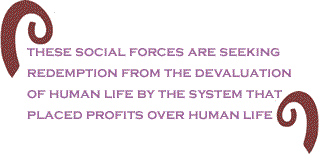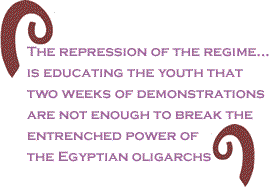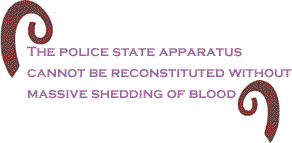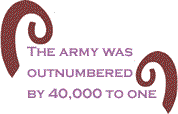The renewed energy
of the popular power in the streets of Egypt ensured that
the political initiative remained in the hands of the
grassroots mobilizers who had come together to trigger
an uprising that is now called “the people’s revolution.”
Their continued tenacity and strategic planning shocked
observers, who were already reporting that “the protests
were running out of steam,” and that “life was returning
to normal in Cairo.”  What
was considered “normal” for the international capitalist
forces that supported the Mubarak regime was the fact
that banks were opening and there were traffic jams on
the bridges across the Nile. But
these stories could not conceal the floods of freedom
as more people surged onto the streets to demand the immediate
removal of the Mubarak regime. These re-energized outpourings
of support for the revolution were beamed around the world
as citizens everywhere who wanted genuine democracy watched
and calculated the balance of forces in the revolutionary
process. Was the tide shifting toward revolt elsewhere?
This was the question being raised in all continents as
ideas of sharing, cooperation and repair were challenging
greed and obscene wealth in the midst of grinding poverty.
What
was considered “normal” for the international capitalist
forces that supported the Mubarak regime was the fact
that banks were opening and there were traffic jams on
the bridges across the Nile. But
these stories could not conceal the floods of freedom
as more people surged onto the streets to demand the immediate
removal of the Mubarak regime. These re-energized outpourings
of support for the revolution were beamed around the world
as citizens everywhere who wanted genuine democracy watched
and calculated the balance of forces in the revolutionary
process. Was the tide shifting toward revolt elsewhere?
This was the question being raised in all continents as
ideas of sharing, cooperation and repair were challenging
greed and obscene wealth in the midst of grinding poverty.
In all revolutionary
situations, small acts of groups and individual acquire
historical importance. The coming together of the grassroots
organizers to form the “Unified Leadership of the Youth
of the Rage Revolution” represented one moment of historical
significance. At this stage of the revolution, the interview
of Wael Ghoneim, who was released from state detention
on Monday February 7, became one more barometer of the
temperature of the people who wanted change. Wael Ghoneim,
a business operator for an international information age
company, had been arrested by the secret police. His testimony
on the brutality and murder of those picked up by the
secret police again exposed to millions the nature of
the police state in Egypt that was called a stable
democracy. As the revolution gained new momentum, people
demonstrated in differing parts of urban centers, even
around government offices and the disgraced parliament.
Thousands of workers intensified industrial actions to
cripple the regime.
Maintaining the
Focus of the Revolution
Esam Al-Amin, in his
writing on the leaders of the youth movement who are emerging
as core organizers and future leaders (Meet
Egypt’s Future Leaders), spelt out the principal demands
being made. Inter alia these demands were: the resignation
of Mubarak, the immediate lifting of emergency law, release
of all political prisoners, the dissolution of both upper
and lower chambers of parliament, the formation of a national
unity government to manage the transitional period, investigation
by the judiciary of the abuses of the security forces
during the revolution, and the protection of the protesters
by the military.
 From
their statements on the internet and in interviews, the
youths have made it clear that their demands are not only
for the removal of Mubarak but that they are calling for
constitutional reforms in the areas of civil rights, political
freedoms, and judicial independence; and economically
addressing poverty, unemployment, social justice and fighting
corruption. It is clear however that political freedoms
and social justice cannot be realized within the context
of the present mode of economic organization. Moreover,
as in Tunisia,
the corrupt and discredited members of the oligarchy want
to remain within the national unity government for the
transitional administration.
From
their statements on the internet and in interviews, the
youths have made it clear that their demands are not only
for the removal of Mubarak but that they are calling for
constitutional reforms in the areas of civil rights, political
freedoms, and judicial independence; and economically
addressing poverty, unemployment, social justice and fighting
corruption. It is clear however that political freedoms
and social justice cannot be realized within the context
of the present mode of economic organization. Moreover,
as in Tunisia,
the corrupt and discredited members of the oligarchy want
to remain within the national unity government for the
transitional administration.
One of the many challenges
of the current stage of what some analysts have called
“the Nile Revolution” is how to take the revolutions in
Tunisia and Egypt through the twists and turns of the counter-revolutionary
planning and scheming coming from the remnants of the
old order. How could the Egyptian and Tunisian peoples
achieve the ultimate goal of the revolutions? The goal
of these revolutions as expressed by the millions who
took to the streets, is a society that would ensure the
human dignity of its citizens by dismantling the old order
of government corruption, repression of freedoms, political
alienation, and denial of economic rights. The challenge
is now how to build on the momentum of the on-going revolutionary
process for a structural reorganization of the economies
to meet the basic needs of the people over and above the
interests of local and foreign capitalists and militarists.
From Alexandria
to Suez and in some cities that did not take significant
part in previous demonstration, workers are building industrial
actions to support the new energy. In particular, the
emergence of judges, lawyers and other professional strata
on the streets of Cairo at a time many thought the revolution
was losing steam has pointed to the realization by sections
of the elite that they can no longer be silent in the
face of the corruption of the values of the society.  In
a society of over 7,000 years, traditions where sharing
and collective security had defined the birth of human
civilizations, these social forces are seeking redemption
from the devaluation of human life by the system that
placed profits over human life. The constant renewal of
this energy and the consolidation of the revolutionary
gains made so far are critical to maintaining the focus
of the revolution.
In
a society of over 7,000 years, traditions where sharing
and collective security had defined the birth of human
civilizations, these social forces are seeking redemption
from the devaluation of human life by the system that
placed profits over human life. The constant renewal of
this energy and the consolidation of the revolutionary
gains made so far are critical to maintaining the focus
of the revolution.
With each passing
day, the news of the formations of popular committees
point to a new form of democratic participation by the
people. These efforts at popular power increased as public
information circulated on the level of theft and corruption
by the ruling family. In a society where there are over
5 million homeless persons in the capital, information
on the palatial homes of the ruling elements included
facts of the more than US$70b accumulated by the Mubarak
family and friends. This information was being discussed
in the streets and factories as the demands of the revolutionaries
were refined to sharpen the need for structural transformation
of the society. Indeed, it is this structural transformation
of society that the workers and all protesters have to
make sure becomes a reality. Egyptian workers must beware
of palliative measures to appease them in lieu of an overhaul
of political and economic structures of their society.
The popular capital of the re-energized people’s power
must be used to refocus attention on the ultimate goal
of the structural transformation of the social and economic
system.
The flood of revolutionary
change from the Nile seem to be flowing to other societies,
and the challenge for progressive persons in the advanced
capitalist countries is to mobilize, so that their societies
are not reorganized for war to beat back an evolving era
of popular struggles for justice.

Money, Power, and
Politics
As the popular forces
to reorganize the society sustain their momentum across
Egypt,
there is greater exposure of the nexus between politics,
money, corruption and power. Ahmed Ezz has emerged as
one of the top politician / business tycoons who were
at the helm of the police state of Mubarak. Ahmed Ezz,
a steel magnate and friend of the son of Mubarak, is a
poster image of the kind of capitalist who used the power
of the state to get rich while millions were poor and
exploited. Ezz is now under investigation on charges of
corruption and there are now judges and lawyers assisting
in the compilation of evidence of corrupt use of state
power. It is in the process of exposing Ahmed Ezz that
the citizens are learning of the roles of the banks, international
financial institutions and the political leadership. Small
and medium size entrepreneurs are also joining the struggle
to lend their weight to the evidence that state-controlled
banks acted as kingmakers, extending loans to families
who supported the government but denying credit to local
industrialists and business persons who lacked the right
political connections.
Exposure of power
brokers such as Ahmed Ezz ensure that there is a coalescing
of the popular forces around the demands for change in
Egypt.
The discussions about
the wealth and interconnections between different branches
of the political class widened the divide in the Egyptian
society between the corrupt forces and decent citizens
who want to put an end to the police state. But the repression
of the regime and its attempt to roll back the revolution
is educating the youth that two weeks of demonstrations
are not enough to break the entrenched power of the Egyptian
oligarchs. The social division between the very rich and
the massive poverty is everywhere to be seen in the human
development indices that point to millions living on less
than $2 per day. In Egypt itself, the young revolutionaries understand
the fact that 40 percent of the Egyptian population lives
on $2 a day - while Mubarak’s wealth is estimated to be
$70 billion.

The Revolution
Continues
It was in an effort
to blunt the coalescing of the democratic forces that
the regime released Wael Ghoneim on Monday, January 7,
and sought to dampen the popular anger by announcing concessions.
Omar Suleiman, a Vice President who has been tarred with
the history of the police state mechanisms, especially
the intelligence services and the secret police, seeks
to blow hot and cold in the face of the resolute spirit
of the forces who are building popular democratic formations
in the streets. Suleiman announced on one day that Mubarak
had endorsed a timetable for a “peaceful and organized
transfer of power” in September. He also announced that
Mubarak has “set up a committee to recommend constitutional
amendments to remove tight restrictions on who can run
for president, and promised there will be no reprisals
against protesters.” Suleiman announced that, “The president
welcomed the national consensus, confirming that we are
putting our feet on the right path to getting out of the
current crisis.” However, these announcements belied the
reality that the regime was gearing up for further thuggery
and the unleashing of death squads and goons. Omar Suleiman
threatened the democratic forces arguing that, “We can’t
bear this for a long time, and there must be an end to
this crisis as soon as possible.”
In an effort to give
the oligarchs time to arrange their transfer of money
outside, the Vice President is putting forward a bold
front by rejecting the immediate departure of Mubarak
when it is known that Egypt had changed fundamentally
and that the police state apparatus cannot be reconstituted
without massive shedding of blood.  Suleiman
promised martial law and a military response if the revolutionaries
did not go home and allow the police state and repression
to continue. It is against this background that the revolution
continues and the peoples’ power persists. Esam Al-Amin
captured the essence of the sophistication of the new
leaders of Egypt
when he noted that “the revolution has adapted to the
maneuvering of the regime and has adopted a comprehensive
program of activities that are creative and extensive.
Time is no longer on the regime’s side. With the passing
of each week, more Egyptians are joining the revolution.
A culture of freedom and empowerment is on the rise.”
Suleiman
promised martial law and a military response if the revolutionaries
did not go home and allow the police state and repression
to continue. It is against this background that the revolution
continues and the peoples’ power persists. Esam Al-Amin
captured the essence of the sophistication of the new
leaders of Egypt
when he noted that “the revolution has adapted to the
maneuvering of the regime and has adopted a comprehensive
program of activities that are creative and extensive.
Time is no longer on the regime’s side. With the passing
of each week, more Egyptians are joining the revolution.
A culture of freedom and empowerment is on the rise.”
Whither the Egyptian
Armed Forces?
The possibility of
massive bloodletting sharpens the maturation of the new
stage of the revolution, as a front against counter-revolution.
Counter-revolutionary elements refer to the opposition
to revolution, particularly those who act after a revolution
to try to overturn or reverse it, in full or in part.
This designation of counter-revolution has been most appropriate
in the actions and statements of Omar Suleiman who is
signaling ahead that the armed forces and police powers
will be used to roll back the demands of the people. This
counter-revolution comes up against the work that has
been done by the networks of workers, farmers, lawyers,
judges, women, students, patriotic business persons, writers,
religious persons and the mass of ordinary people who
built new organizations for emancipation.
The strength of the
networks of networks among the revolutionary forces is
being harnessed so that the people can consolidate the
self-defense structures, while sharpening the connections
between the dismantling of the police state and subduing
the culture of crony neo-liberal capitalism. This is where
the strength in numbers of those opposed to the police
state will prove decisive. The decisiveness and confidence
of the popular forces is already evident by the massive
numbers that turned out on Tuesday so that the army was
outnumbered by 40,000 to one. These numbers were one response
to the warning from Vice-president, Omar Suleiman, that
there could be a coup if popular forces did not accept
the regime’s timetable for a transition to democratic
rule.
 What
Suleiman and his foreign handlers mean by democratic rule
is the exit of Mubarak with some cosmetic changes to reconstitute
the police state of neo-liberalism with new persons at
the helm. In this new struggle, there is an intense campaign
within the military to buy the allegiance of the top brass
of the military into accepting the discredited form of
rule that has kept down the people of Egypt. There are now divisions within the military.
There are disagreements between some elite officers who
were bought off by the regime and the rank and file of
conscripted persons who will be crucial to the decision
at the crossroad between rivers of blood and the tides
of freedom. In the first test at this crossroad, the police
state fell on the wrong side of history by attempting
to stifle information and abort the revolution.
What
Suleiman and his foreign handlers mean by democratic rule
is the exit of Mubarak with some cosmetic changes to reconstitute
the police state of neo-liberalism with new persons at
the helm. In this new struggle, there is an intense campaign
within the military to buy the allegiance of the top brass
of the military into accepting the discredited form of
rule that has kept down the people of Egypt. There are now divisions within the military.
There are disagreements between some elite officers who
were bought off by the regime and the rank and file of
conscripted persons who will be crucial to the decision
at the crossroad between rivers of blood and the tides
of freedom. In the first test at this crossroad, the police
state fell on the wrong side of history by attempting
to stifle information and abort the revolution.
As the Revolution
Matures
We have been studying
the trajectory of this revolutionary process, which started
in Tunisia
and has matured to a new stage in Egypt: that of reconstruction and consolidation
of the gains of revolution. The first four stages were
spelt out in our previous writings. At this juncture, it is critical to grasp
the balance of forces so that counterrevolutionary elements
– whether in the military, among the old ruling elites,
religious zealots, local and international capitalist
/ militarist interests, or new fronts of power elites
– do not hijack the goal of the revolution.

From the voices of
revolution, it is clear that the network of organizers
among the April 6 movement and from the ranks of the militant
workers are readying themselves for a prolonged and protracted
struggle. Those who would be bought off to be thugs are
being exposed, as alternative political and social organizations
emerge to defend the people. The working poor and the
organized workers are now coming out to support the youth,
and the April 6 Youth movement is showing new determination
to stand up to the challenges of the struggle. As one
youth said and reported in the UK Guardian,

